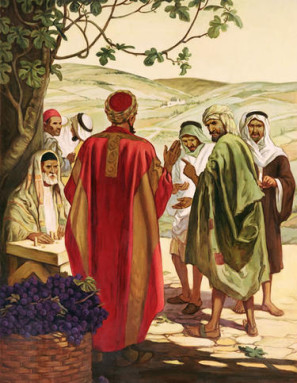Showing posts with label Parables. Show all posts
Showing posts with label Parables. Show all posts
11th Sunday - Parable of the Mustard Seed
Michel DeVerteuil Textual Comments
We see Jesus in this passage searching for the right metaphors to illustrate the concept of the kingdom of God, and we are reminded that today we need to find new images to illustrate our own vision of God’s kingdom.
Easter 5 Sunday B - Vine and Branches
The Lord may find us as we search for him - Mary at the tomb (it's he who finds us even though it's we who search for him even as Zacchaeus). The Lord may give us a personal experience of him in our theological and ideological doubts (Thomas. That's another form of searching for him like Augustine and Thomas Merton).
32 Sunday A: 10 Virgins: 5 Wise and 5 Foolish
Michel DeVerteuil
General Comments
Today’s passage is a teaching on “what the kingdom of heaven will be like” (verse 1). This biblical expression means the coming of grace into the world. The passage therefore is a teaching on grace, inviting us to recognise and celebrate our experiences of grace, and to prepare ourselves for future comings.
“Will be” is a reminder that the final and definitive coming of grace lies in the future, but the teaching also refers to the many partial but real comings of grace that we and our communities (including the worldwide human family) have experienced.
27th Sunday A: Parable of the KOG: Vineyard and Tenants
Story Starters: From Fr. Tony Kadavil’s Collection
17 Sunday A - Liturgical Prayers
Greeting (See Second Reading)
God chose us specially long ago
and destined us to become true images of his Son,
so that Jesus might be the eldest
of many brothers and sisters.
May our brother Jesus be always with you.
and destined us to become true images of his Son,
so that Jesus might be the eldest
of many brothers and sisters.
May our brother Jesus be always with you.
17 Sunday A: The Hidden Treasure - Parables of the KOG
There is a price for relationship - Treasure Hidden Rabindra Nath Tagore, the mystic poet of India, tells a memorable story from his own life which illustrates the truth of what Jesus teaches in today’s gospel, namely, that there is a price we have to pay in order to be in his kingdom, to keep a relationship with him.
Jesus, the True Vine – May we be his branches that bear fruit
Jesus, the True Vine – May we be his branches that bear
fruit
We thank you, gracious God, for Jesus Christ the true vine,
with his roots eternally grounded in you. We rejoice that by grace we have been
grafted into him, to be branches on a vine which bears the loveliest of all the
fruits of earth. Yet we confess that all is not well with the way we live.
30th Sunday C - The Pharisee and The Tax Collector at the Temple
30th Sunday of Ordinary Time from heartnoi2k
Thomas O’Loughlin
Introduction to the Celebration
Today we are going to reflect on self-knowledge and humility. By gathering here in public we are telling the world that we take the need to profess faith in God seriously; we are saying we are people with a definite way of life, that we have taken up the cross of discipleship. But without humble awareness of our faults and our need of God’s mercy, we could be deceiving ourselves. Let us ask the Spirit to enlighten our minds that we might know our failings, and to give us the humility to ask for mercy.
***********
Lent 4 Sunday C: Laetare (Rejoice): I lost him and Now I found him
4th Sunday of Lent C:


******************************************************
Michel de Verteuil
General comments
Verses 1 to 3 are one of several passages in the gospels which give us an overall picture of Jesus’ lifestyle. In your meditation, identify who for you are “the tax collectors and sinners,” people who are outsiders to the community; then, who is Jesus, and finally, who are “the Pharisees and Scribes” who complain.

******************************************************
Michel de Verteuil
General comments
Verses 1 to 3 are one of several passages in the gospels which give us an overall picture of Jesus’ lifestyle. In your meditation, identify who for you are “the tax collectors and sinners,” people who are outsiders to the community; then, who is Jesus, and finally, who are “the Pharisees and Scribes” who complain.
27 Sunday A - Workers of the Vineyard & Stewardship
Story Starters: From Fr. Tony Kadavil’s Collection
Gospel text : Matthew 21:33-43
1) Wild Vines in the Lord’s Vineyard
In his book From Scandal to Hope, Fr. Benedict Groeschel (EWTN), examines the roots of the clergy sex-abuse scandal. He details how disloyalty spread through seminaries, universities, chanceries and parishes. The most notorious case was that of Fr. Paul Shanley who helped found the North American Man-Boy Love Association in 1979. He lectured in seminaries, once with a bishop in attendance, maintaining that “homosexuality is a gift of God and should be celebrated,” and that there was no sexual activity that could cause psychic damage-- “not even incest or bestiality.” No wonder Fr. Charles Curran had little trouble getting seventy-seven theologians to sign a protest against Humanae Vitae, an encyclical which reaffirmed marital chastity! A few years later the Catholic Theological Society (CTS), published Human Sexuality: New Directions in American Catholic Thought, a study which accepted cohabitation, adultery and homosexuality. Now, however, all these chickens have come home to roost. We are paying the price – in lawsuits, public humiliation and loss of credibility. The media gave us a glimpse of the enormous destruction in the Lord’s vineyard done by those wicked tenants. They did so with great relish because the scandals discredit a teaching authority they, by and large, find annoying. But this attention by the media has had consequences the media probably did not intend. It has alerted Catholics to the widespread pillaging of the vineyard, which ultimately means the damnation of souls. Fr. Groeschel asks, “Does all this scandal shake your faith in the Church?” He answers, “I hope so, because ultimately your faith should not be in the Church. Ultimately your faith is in Jesus Christ. It is because of him that we accept and support the Church. We believe in and belong to the Church because Christ established it on his apostles." We see in today’s Gospel that the owner of the vineyard is God. He will care for his Church, not by committees or document, but by raising up saints who will properly tend the vineyard.
25 Sunay A: The Workers of the Vineyard
Gospel reading: Matthew 20:1-16
 Michel DeVerteuil
Michel DeVerteuil General Comments
We have another parable this Sunday, one that many people find particularly difficult to interpret.
As I said in last week’s meditation guidelines, method is always the root problem with interpreting parables, and to adopt the right method we must have a right understanding of what a parable is. It is not the kind of story where we identify “good guys” and “bad guys” and then draw the conclusion that we must imitate the good and avoid being like the bad.
Subscribe to:
Comments (Atom)
